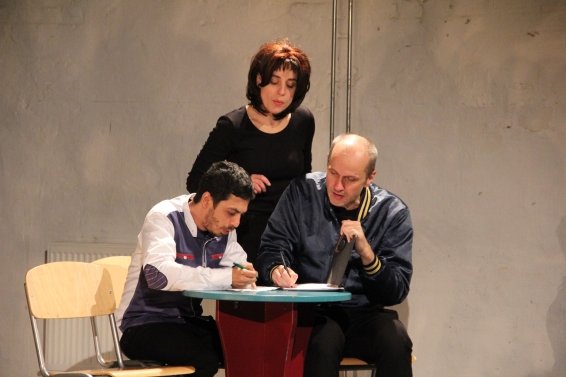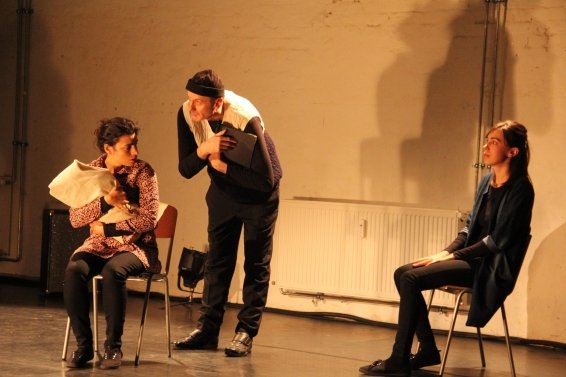“Romo Sapiens”, Theatre on Discrimination and Migration
An Excellent Piece on Migration, Stereotypes and Cultural Differences
November 03rd, 2015The Romanian Cultural Institute announced “Yesterday Was Also Today” showcase in Düsseldorf. The exposition brings together over 30 representative works from the Daniel Ștefănică contemporary art collection. The showcase was first presented in Frankfurt am Main in June 2015, during the event “Romanian Culture Days”. The same exhibition will be showcased in Berlin, at the Romanian Cultural Institute’s Gallery.
The Romanian Cultural Institute in Berlin is announcing the documentary-theatre piece called “Romo Sapiens”. “Romo Sapiens” is set in Romania and Germany and looks at discrimination in the context of migration.
The play is written and directed by the Romanian, author and dramatist, Alina Nelega and Berlin-based, author and film director, Kincses Réka. The play is representative of the ideas of community involvement, European values and the fight against racism and discrimination. “Romo Sapiens” was developed in collaboration with the National Theatre of Târgu Mureș, Romo Sapiens Association, Heimathafen Theatre in Berlin and südost Europa Kultur e.V. Association.
Alina Nelega is a playwright who has also written some novels, her works have been published and translated into a large variety of European languages and performed both in Romania and internationally. She is also an academic and coordinator of multiple undergraduate and graduate theatre programmes at Târgu Mureș Arts University. Ms. Nelega has received awards from the national and international theatrical community for some of her works.
Kincses Réka has graduated from Cluj-Napoca University and the Catholic University of Budapest. In 2006 she also graduated from the German Film and Television Academy in Berlin with the movie “Campionul din Balcani” (The Champion in the Balkans). The movie won multiple awards at Graz, Linz, Nurnberg, Duisburg, Toronto, and Sibiu.
The play covers cultural differences between three represented communities, the Roma, the Romanian, and the Germans. The action takes the audience back and forth between Romania and Berlin, following, in parallel, the integration of Romas in both Romanian and German communities. The German, Romanian and Roma actors, working together, draw a picture of what the lack of communication and understanding brings upon communities. By illustrating documented actions and bringing forward stereotypes the play stresses the importance of building cultural bridges.
The performances will take place at Pier 9, Probebühne des Heimathafen Neukölln. The premiere took place on October 30th, at 20:00. However three further performances are scheduled for October 31st, November 1st and 3rd, at 20:00. The price for tickets in advance is 15 EUR and the reduced price is 10 EUR.
The theater play-Romo Sapiens is a result of a collaboration between National Theater from Târgu Mureş and Heimathafen Neukölln, with actors from both Romania and Germany. The play tackles sensitive issues such as discrimination and racism and looks to raise awareness about Roma people and the difficulties they face in their everyday life.
On 1.10.2015, ICD went to one of the 3 performances of Romo Sapiens and conducted an interview from the two directors- Alina Nelega and Kincses Réka.
Where did you get the idea for the play from?
Alina Nelega: We participated in a project about Romanian–Hungarian cohabitation and during the working process, we realized that there are in Romania some other minorities that face similar problems. Especially, we noticed there are not enough discussions about the Roma minority. We also think that a special approach for this issue was necessary.
What kind of impact do you think the play will have in Germany?
Kincses Réka: Our spectators included Roma people that live in Germany and for us, it is very important to see that they feel represented in this play. Also, we have tried to bring together in this play three different worlds– German intellectuals, Romanian Roma people that live in Germany and Romanians . We think we succeeded in this way to build a bridge between them in an original way.
From a local perspective, we are trying to show people here what is behind Roma people’s attitudes. It is hard sometimes to find the motives behind people’s reluctance to go to integration courses for example, and this is exactly what we tried to do: to make people see things from Roma people’s perspective. It is more about being sensitive and understanding, and we hope that this theatre play will help them understand.
Was the theatre play inspired from real events?
Alina Nelega :Yes, both stories the Romanian one and the one from Germany, were inspired from real life situations. They are both picturing the problems that the Roma community encounters in their home country and abroad.
From your point of view, what do you think are the main problems when we are talking about the integration of Roma people?
Kincses Réka :We cannot give you a precise answer because the role of art is to ask questions and to bear the burden that we don’t have the answers
References and Links
- Links: http://icr.ro/berlin/spectacolul-romo-sapiens-de-alina-nelega-si-reka-kincses-la-pier-9-heimathafen
Sonia Diana Dordea and Madalina Miu, Berlin Global




